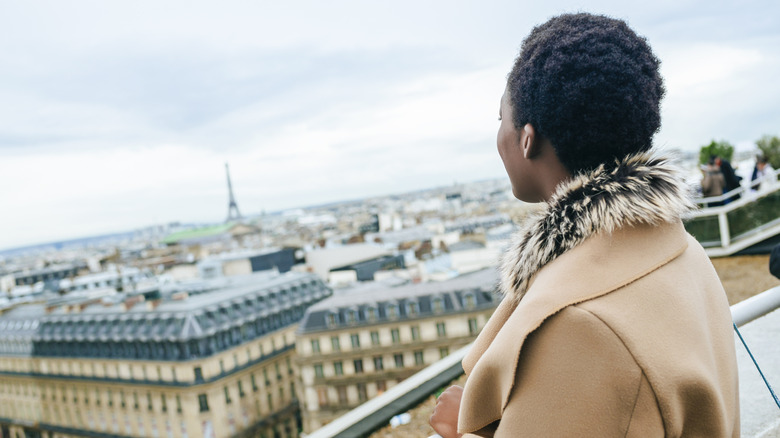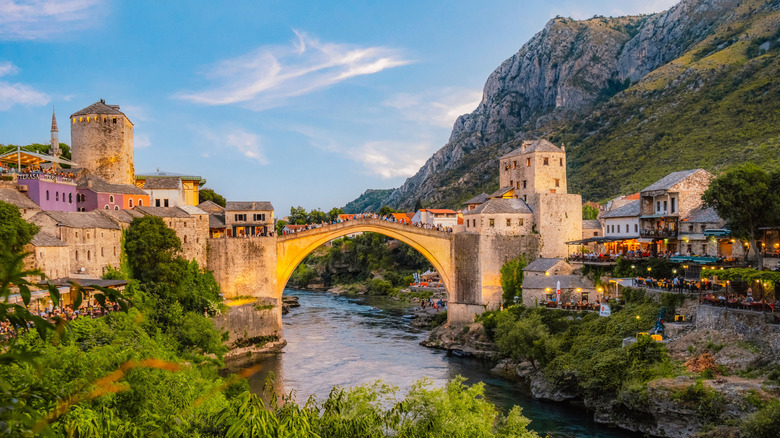Rick Steves' Warning About Potential Encounters With Racism While Traveling Throughout Europe
A romantic European escape is a dream for many. Traveling is not the same for everyone, though, especially as a minority. When Oneika Raymond, an award-winning journalist and writer, started traveling the world, she had some awkward encounters with locals. In one of her first posts on Oneika the Traveller, she recalled, with good humor, how some Hungarians reacted to seeing her in the capital of Budapest. "Being the lone Black girl here (I've only seen one other all day), I have gotten a number of stares beholding my chocolately goodness in all its glory (and also because my hair is looking a hot mess right about now...Hope dreadlocking my hair is still a good idea!)."
Uncomfortable stares, inappropriate comments, and even invasive requests to touch your hair or skin are common examples of what some travelers of color have experienced on the road. Destinations in Europe are no exception. A 2023 study by the European Union Agency for Fundamental Rights found that racism was on the rise in Europe, particularly in Germany, Austria, and Finland, while some countries, namely France and Portugal, saw a slight decrease in reports of racism. As travel pro Rick Steves warns on his website, history, culture, and politics are all at play when locals meet travelers of ethnicities they are not familiar with. "Will you encounter unfriendliness in your travels?" Rick Steves writes on his website. "Definitely — and racism may be behind some of it." Understanding cultural contexts can help travelers determine their responses.
Understanding cultural differences in Europe
"By American standards, Europeans can be opinionated and blunt," writes Rick Steves on his website. "What's considered polite conversation in Europe can be shockingly different from our own unwritten rules." This is true in many European countries. Both the Dutch and Germans have a reputation for being unsmilingly direct. The sunnier nations of Southern Europe are not exempt, either. Remarks about the color of one's skin or the shape of one's eyes are not uncommon, and are often considered statements of fact rather than simply being rude.
Colloquialisms can also come as a shock. For example, it may surprise travelers in Spain to hear neighborhood variety stores referred to as "chinos" because they are usually run by Chinese families. Singaporean blogger and traveler Xuyun Zeng admits the term is a little off-putting, but it also allowed him to learn about Spain's thriving multi-generational Chinese community. "You have Euroshop in Germany, Poundland in the UK, Dollarama in Canada and Family Dollar in the US," he explains in his blog Far From China, "However, in Spain, this industry is run by Chinese families. In almost every sizeable town, you'd find someone selling stuff you'd find in a dollar store."
European cities, in particular, have a cosmopolitan mix that many American travelers may be at home with, far from national stereotypes. Hollywood gets a lot wrong about France, for example. It's not all "Emily in Paris" glam and (mostly white) romance. The City of Light has long been a magnet for Black American artists from Josephine Baker to James Baldwin, and the largest share of immigrants in the city are from African countries. There are now several tours available to explore "Paris Noir," the history and culture of Black Paris.
Exploring a different lens on identity when traveling
Like the United States, Europe is grappling with issues of identity and immigration. "Across Europe, authorities are under pressure to keep out undocumented arrivals — and often that means targeting non-white travelers at border crossings and airport security," warns Rick Steves, "Be prepared for the possibility of being closely scrutinized before continuing on your way." That could mean more questions at passport control or an extra security check. Reading up on current events in your chosen destination is a good way to be mindful of those local sensitivities.
At the same time, travel allows visitors to see their own identity from another point of view. British writer Tharik Hussain traveled to Sarajevo and was astonished to discover that Bosnia, an underrated mountain gem, was also home to a wealth of indigenous Muslim culture in Europe. The experience inspired him to write a book. "I went on a journey in search of Europe's indigenous Muslims, and the route we took took us through six countries. Three of them are Muslim countries: Bosnia Herzegovina, Kosovo, and Albania are Muslim in population like my country of birth, Bangladesh," he told an audience at the Abrar Islamic Foundation. " And yet the idea of European Muslim countries today is some kind of oxymoron."
While Europe is complex and diverse, for US visitors of color, Rick Steves writes, "In general, though, your Americanness will probably be more notable to the Europeans you meet than the color of your skin."


